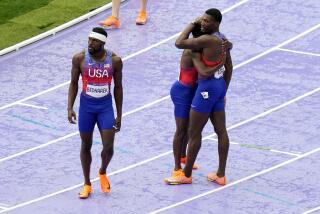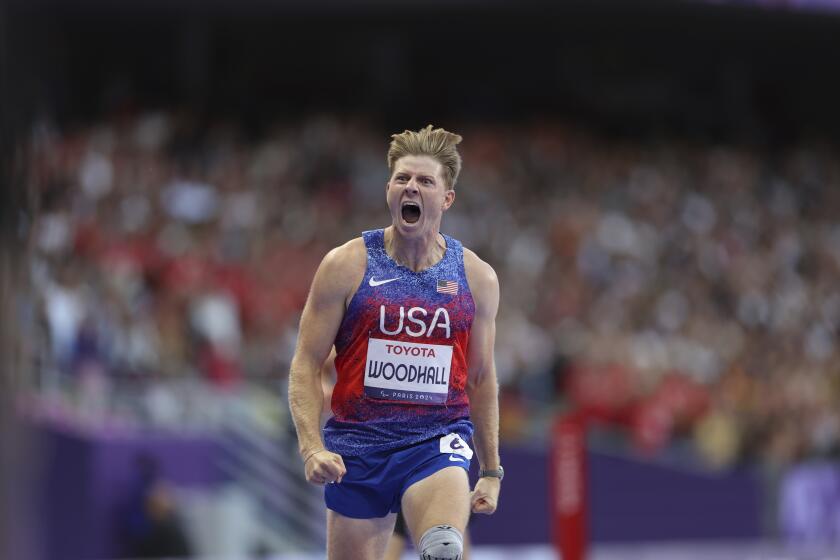No Leg to Stand On
ATLANTA â Oh. Canada.
It would be easy today for some of us to gloat to U.S. track and field Coach Erv Hunt, âWe told you so.â In conjunction with Dennis Mitchell, the U.S. sprint captain, he foolishly chose to leave Carl Lewis off the team in the 400-meter relay final Saturday night.
The U.S. team of Jon Drummond, Tim Harden, Michael Marsh and Mitchell finished second, the first time the Americans have ever failed to win an Olympic sprint relay race that they managed to finish.
There were three times when they couldnât even do that. In 1912, 1960 and 1988, they either dropped the baton or committed a disqualifying zone violation.
Those gaffes, along with others in World Championships, World Cups and other prestigious races, have become an embarrassing part of the U.S. sprint relay tradition and one of the most compelling reasons for Lewis to have been on the track Saturday night in Centennial Olympic Stadium instead of watching from a VIP box.
Lewis, 35, might no longer be in his prime, when he anchored teams that won two Olympic gold medals, set six world records and ran 12 of the 20 fastest times ever before Saturday. But he would have been the most experienced runner in an event that demands an unflinching hand and heartbeat. The United States never needed his calm confidence more than it did in this race.
Now that weâve said that, letâs add this: At the end of the day, even Lewis running the anchor leg probably would not have made a difference in the color of medals the U.S. sprinters had around their necks.
The Canadians are the best in the world by a decisive margin.
Even with anchor Donovan Bailey, the world-record holder in the 100 meters as of eight days ago, they seemed vulnerable. Or perhaps we should say that because of Bailey they seemed vulnerable.
He is the worldâs fastest man but reputedly unreliable on the relay. That was apparent in the semifinal Friday night, when he seemed to shy away from the baton being passed to him as if it was a stick of dynamite.
It is time, however, to give him his due. The last two times he has had to perform in finals, in the 1995 World Championships and in the Olympics, he has been perfect. The Canadians prevailed both times.
Their victory was suspect last summer because the United States was not in the final, having been unable to get the baton all the way around the track in the first round. There was no doubt this time.
âTo be blunt about it, we were barbecued,â Marsh said.
The Canadians won Saturday night in 37.69 seconds, the sixth-fastest time ever and the fastest time by a team from outside the United States. It also was the fastest time ever run by a team inside the United States. They might have challenged the world record of 37.40 set four years ago in Barcelona by the Lewis-anchored U.S. team if Bailey had not started his victory dance several meters before the finish line. Even so, they smoked the United States, which finished second in 38.05.
Bailey said that he and his teammates were motivated by talk in the media last week that all Lewis had to do to clinch an unprecedented 10th gold medal was show up in the relay.
âThere was no mention that we were world champions last year, that there were a couple of guys up north who could win the gold medal,â Bailey said.
Lewis would not have made a difference in the outcome, Bailey said.
Hunt agreed.
âAbsolutely not,â said the University of California coach. âWith Carl, it could have been worse. We werenât going to beat Donovan. Who knows? We could have been even farther behind.â
Who knows? They could have been ahead when Lewis got the baton, which would have given him a chance to beat Bailey.
If Lewis had been named to anchor the team, Hunt would not have had to ask Harden to run the second leg. Harden, 22, is fast enough to have won the NCAA championship in the 100 meters two years ago for Kentucky, but he has no international experience in the relay. Last week during practices, other team members railed at him for his blunders.
He committed some big ones Saturday night, both in the exchange from Drummond and before the handoff to Marsh when Harden thought the baton was about to slip from his left hand and shifted his right hand over to push it more securely into his palm. He said later that the maneuver cost him no time, but it looked as if he was running in slow motion. His split time of 9.36 was 0.34 behind the 9.02 run by Canadian counterpart Glenroy Gilbert. By how much did the Canadians win? 0.36.
A U.S. team of Drummond, Marsh, Mitchell and Lewis, in that order, would have been much more dependable. All have run on either Olympic or World Championship gold-medal teams. All have run on teams that set world records. They might not have won, but they would have been in the race.
Bailey guessed that Lewis did not want to be on the track again after winning the long jump Monday night.
âI think Carl is a better businessman than that,â he said. âHe won a gold medal and he wanted to stay golden. There wasnât another gold medal available to him.â
Perhaps. But it was dumb not to ask him.
*
* NO CARL, NO GOLD
After Carl Lewis was left off it, the U.S. menâs 400-meter relay team finished second for the first time in the Olympics. A1
(BEGIN TEXT OF INFOBOX / INFOGRAPHIC)
The Fastest 4X100 Relays
The 10 fastest times recorded in the 4X100 relay:
*--*
Mark Country Year 37.40 United States 1992 37.40 United States 1993 37.48 United States 1993 37.50 United States 1991 37.67 United States 1991 37.69 Canada 1996 37.75 United States 1991 37.77 Britain 1993 37.79 France 1990 37.79 Santa Monica TC/U.S. 1994
*--*
More to Read
Go beyond the scoreboard
Get the latest on L.A.'s teams in the daily Sports Report newsletter.
You may occasionally receive promotional content from the Los Angeles Times.







